Module 11 Body language Unit 2 Here are some ways to welcome them 课件(37张PPT)+内嵌音频
文档属性
| 名称 | Module 11 Body language Unit 2 Here are some ways to welcome them 课件(37张PPT)+内嵌音频 | 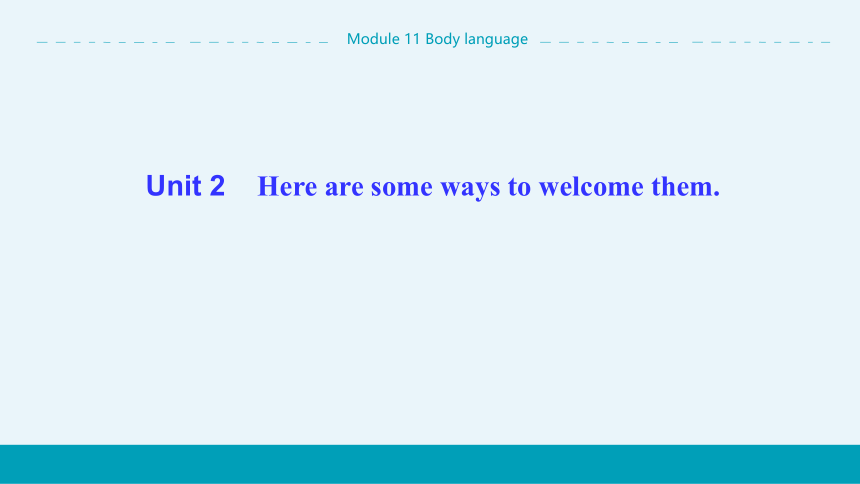 | |
| 格式 | zip | ||
| 文件大小 | 2.9MB | ||
| 资源类型 | 教案 | ||
| 版本资源 | 外研版 | ||
| 科目 | 英语 | ||
| 更新时间 | 2020-04-12 10:22:30 | ||
图片预览


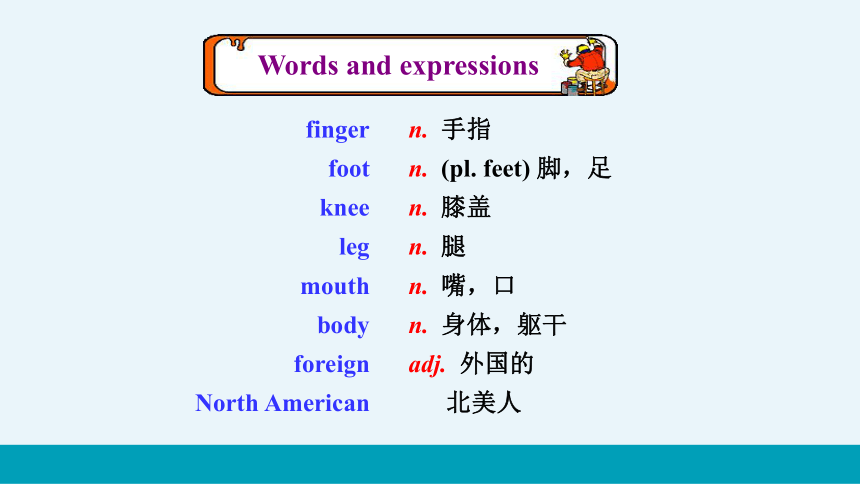
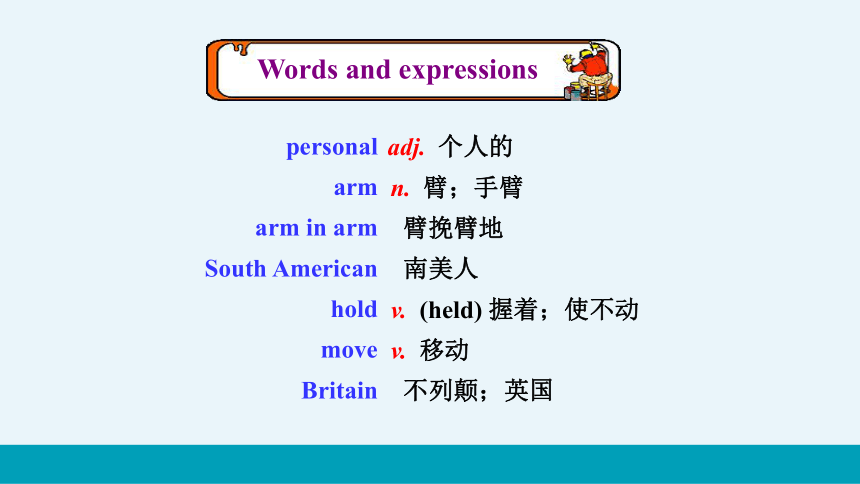
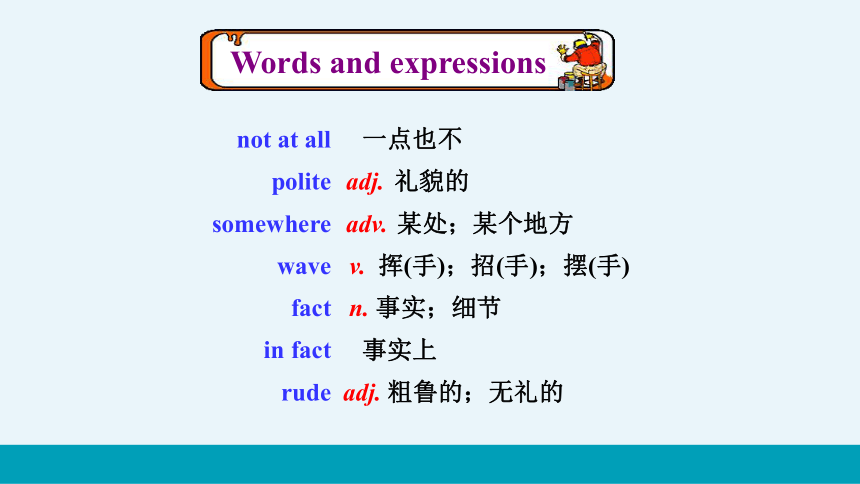


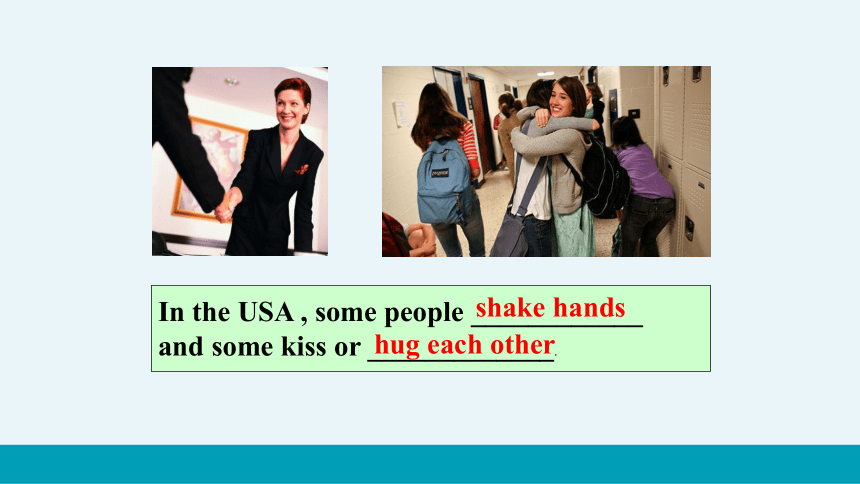
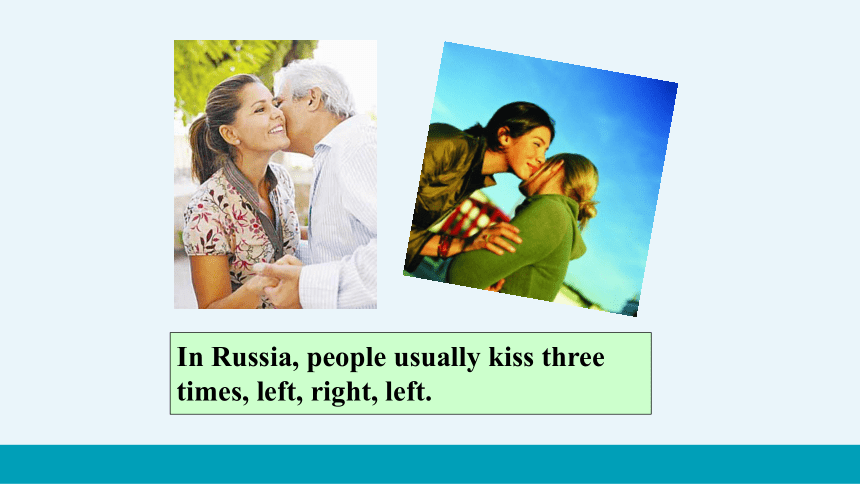
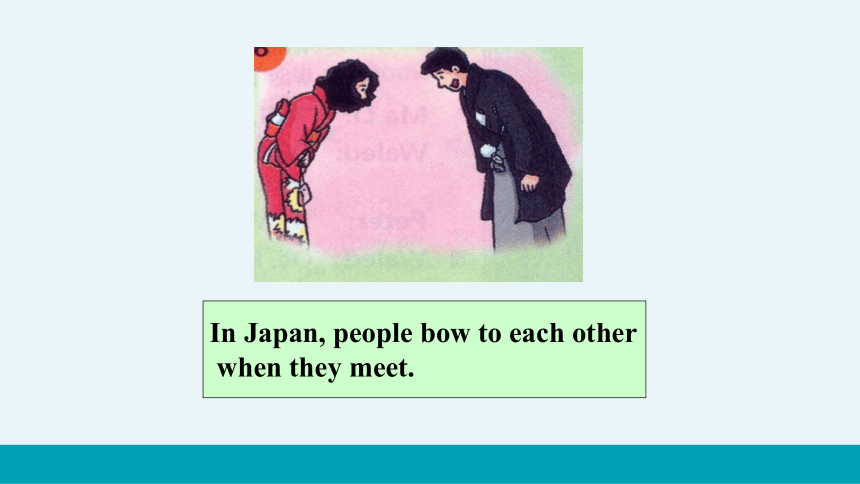

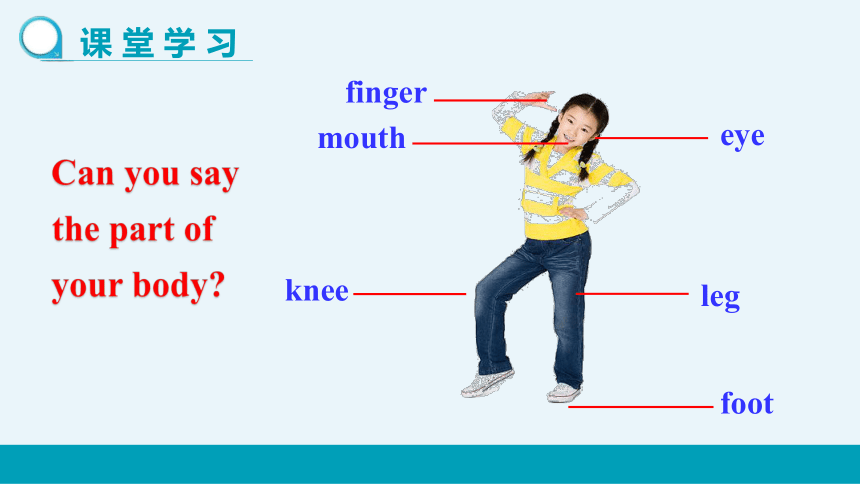
文档简介
课件37张PPT。 Unit 2 Here are some ways to welcome them.
Module 11 Body language能正确读出、写出 Module 11 Unit 2 单元的新单词学习不同国家的人的不同的肢体语言理解祈使句的用法finger
foot
knee
leg
mouth
body
foreign
North Americann. 手指
n. (pl. feet) 脚,足
n. 膝盖
n. 腿
n. 嘴,口
n. 身体,躯干
adj. 外国的
北美人personal
arm
arm in arm
South American
hold
move
Britain adj. 个人的
n. 臂;手臂
臂挽臂地
南美人
v. (held) 握着;使不动
v. 移动
不列颠;英国not at all
polite
somewhere
wave
fact
in fact
rude 一点也不
adj. 礼貌的
adv. 某处;某个地方
v. 挥(手);招(手);摆(手)
n. 事实;细节
事实上
adj. 粗鲁的;无礼的In India, people greet each other by ______
their hands _______ and ________________.nodding their headsputtingtogetherDo you remember the different ways of greeting around the world?
In New Zealand, Maori people greet each
other by________________.touching nosesIn the USA , some people ____________
and some kiss or _____________.shake handshug each otherIn Russia, people usually kiss three
times, left, right, left.In Japan, people bow to each other
when they meet.In France, people shake hands in the office every morning. Can you say the part of your body?eyefingerfootkneelegmouthFast readingRead and find key sentence for each paragraph.P1 P2 P3 P4 P5 How close do you stand when you talk a friend?How about touching people?Do you look at people when you talk?How do you say goodbye?Here are some ways to welcome them.Careful reading 1.It is polite to stand close to people in the ___________. Middle East2.It is rude to stand close to people in ______________.North America Give them more personal space.We can’t stand too close to them.Middle EastNorth AmericaRead Paragraph 2 and chooseLike walking arm in armLike holding your armDon’t like touching at allRead Paragraph 3 and choose the right answers.like walking arm in armlike holding your armsdon’t like touching at allRead Paragraph 4 and answer the questions.1. Do the British look at each other when they talk?
2.Is it always polite to look at each other when you talk?No, it isn’t. Yes, they do. In Britain and the US, people usually look at each other when they talk.In some places, it isn’t polite to look at people when you talk, but in other countries it isn’t polite to look somewhere else.1. Is body language the same in different countries?
2. Is it all right to stand close to people in the Middle East?
3. Do the British like touching people?
4. Do Americans look at people when they talk?
5. Do people in Greece wave goodbye?Answer the questions: No, it isn’t.Yes, it is.No, they don’t.Yes, they do.No, they don’t.3 Check the body language you can use in different
countries and places.√√√√ 4 Complete the passage with the words from the box.Britain fact foreign hold move personal
polite rude someone waveLingling: People from _______ countries have different
body language from us. In _______ ,people don’t like to
touch other people, but in South America they like to
_____on to you so you can’t _____away. Remember
to give _______ from North America lots of _______
space. In some countries it isn’t ______ to look at people
when you talk. And it isn’t polite to______ goodbye in
Greece. In ______,it’s quite _____ !factBritain holdmovesomeonepersonalpolitewaveforeignrudeWriting 5 Work in groups. Talk about your class rules.(1) — Shall we stand up when we answer a question in class?
— Yes, we shall.
(2) — What do you do when you want to ask a question during class?
— I always put up my hand first.6 Make a list of class rules for new students in
your school.Stand up when you answer a question in class.
Don’t be late for class.
Be polite to the teacher.
Don’t eat food in class.
…Language pointsHere are some ways to welcome them.
这儿有一些欢迎他们的方式。here (副词),表示“在这里”。
Here is/are“这儿是, 这儿有”。
Ann is not here. 安不在这儿。
— Where is my bag?我的包在哪儿?
— It’s here. (= Here it is.)在这儿。
— Where are they? 他们在哪儿?
— They are here. (= Here they are.)他们在这儿。 Here are some apples.
(相当于Some apples are here.) 这有一些苹果。 Is everyone here today? 今天大家都到这儿了吗?
Are we all here? 我们都在这儿了吗?
主语是名词时(完全倒装):Here +谓+ 主语(名词).
主语是代词时(部分倒装):Here + 主语(代词) + 谓.2. way 方式,方法,道路
1) some ways to do sth.= some ways of doing sth.
做……的方法/方式
There are many ways of _________(shop).
=______________________________.
There are many ways to shop.2) the way to…. 去…的路;
on the/ one’s way to….. 在去…的路上shopping3. Give them more personal space.
给他们更多的私人空间。 personal adj. 私人的;个人的
Don't question me about my personal business!
不要问我个人的私事!
Be careful how you start the personal computer.
要注意怎样启动个人计算机。
This is my personal problem.
这是我个人的问题。4. Chinese girls often walk arm in arm with their friends.
中国女孩经常和朋友们臂挽臂走路。 arm in arm 臂挽臂
We often walk along the street arm in arm.
我们经常臂挽臂地沿着街走。
I saw them go shopping arm in arm last weekend.
上周末我看到他们臂挽臂地去购物了。
5. South Americans sometimes hold your arm when they talk to you…南美人有时在他们和你交谈时抓着你的胳膊……
hold v. 握住,抓住
hold one’s arm 抓着某人的手臂
The little baby got to the chair by holding her mother’s arm.
这个小女孩抓着妈妈的手臂坐上了椅子。
He helped Grandma Wu up to her feet by holding her arm.
他搀着吴奶奶的手臂帮她站起身来。1)用于回答感谢,意为“不用谢;不客气”。如: A: Thanks for helping me.谢谢你帮助我。 B: Not at all. I enjoyed it.别客气,很高兴能帮你。 A: Thank you very much.非常感谢你。 B: Not at all. It was the least I could do.
不用谢,这是我应该做的。 2)用于回答带有感谢性质的客套话。意为“没什么;哪里哪里”。如: A: You are very kind.你真好。 B: Not at all . 没什么。 A: It's very kind of you.你真客气。 B: Not at all.哪里哪里。6. not at all 用法小结:3)用于回答道歉,意为“没关系”。如: A: I'm sorry I'm late.对不起,我迟到了。 B: Oh, not at all. Do come in.噢,没关系,请进来。 A: I'm sorry to keep you waiting.对不起,让你久等了。 B: Oh, not at all. I've been here only a few minutes.哦,没关系,我也刚到几分钟。 4) 用来表示否定(是No的加强说法), “一点也不; 完全不”。如: A : Are you busy? 你忙吗? B : Not at all.一点不忙。 A : Is it difficult to study English? 英语难学吗? B : Not at all.一点不难。 A : I’ll be away on a business trip. Would you mind looking after my cat? 我要因公出差,请帮我照看一下我的猫,你介意吗? B: Not at all. I’ll be happy to.一点不介意,我很乐意。7. In fact, it’s very rude!事实上,这很粗鲁! (1)in fact“其实; 事实上 ”,通常放在句首。
In fact, I think you’re right.
其实,我认为你是对的。
In fact, I think an old car is better than none.
事实上,我认为有一辆旧车总比没车强。
He doesn’t mind. In fact, he is very pleased.
他不介意。事实上,他很高兴。 (2)rude adj. 粗鲁的,无礼的 = impolite
Don't be so rude to your parents!
别对你的父母这么没礼貌!
It's very rude of her to leave without telling us.
她不向我们打声招呼就走了,这是非常不礼貌的。
It is rude to spit in public.
在公共场合吐痰是粗鲁的。I.根据汉语提示完成句子。
1. _______ (事实上), we use body language every day.
2. Please _________ (小心)! There is a car in front of you.
3. These ________________ (南美人) can speak Chinese very well.In factbe carefulSouth Americans4. Those girls walked into the clothes shop
___________ (臂挽臂地).
5. Mike ________ like meat _____ (一点也不).arm in armdoesn’tat allII. 单项选择。 1._____ the door. It’s cold outside.
A. Opening B. Don’t open
C. Not open D. To open
2.Hi,Rose.Let’s_____ lunch together.
A.to have B. has C. having D. have
3.Please ______ in the library.
A. quiet B. to quite C. be quiet D. being quietBDC4. Mr. Black is living ________the post office.
A.close at B.close to
C.closely in D.closed with
5. —It's a little cold. Would you mind closing the window?
— ________.
A.Forget it B.No,you can't
C.Not at all D.Of courseBC1. Retell the passage:Here are some ways to
welcome them.
2.Review the words and expressions of Unit 2.
3.Finish the exercises of this Unit.HomeworkThank you !
Module 11 Body language能正确读出、写出 Module 11 Unit 2 单元的新单词学习不同国家的人的不同的肢体语言理解祈使句的用法finger
foot
knee
leg
mouth
body
foreign
North Americann. 手指
n. (pl. feet) 脚,足
n. 膝盖
n. 腿
n. 嘴,口
n. 身体,躯干
adj. 外国的
北美人personal
arm
arm in arm
South American
hold
move
Britain adj. 个人的
n. 臂;手臂
臂挽臂地
南美人
v. (held) 握着;使不动
v. 移动
不列颠;英国not at all
polite
somewhere
wave
fact
in fact
rude 一点也不
adj. 礼貌的
adv. 某处;某个地方
v. 挥(手);招(手);摆(手)
n. 事实;细节
事实上
adj. 粗鲁的;无礼的In India, people greet each other by ______
their hands _______ and ________________.nodding their headsputtingtogetherDo you remember the different ways of greeting around the world?
In New Zealand, Maori people greet each
other by________________.touching nosesIn the USA , some people ____________
and some kiss or _____________.shake handshug each otherIn Russia, people usually kiss three
times, left, right, left.In Japan, people bow to each other
when they meet.In France, people shake hands in the office every morning. Can you say the part of your body?eyefingerfootkneelegmouthFast readingRead and find key sentence for each paragraph.P1 P2 P3 P4 P5 How close do you stand when you talk a friend?How about touching people?Do you look at people when you talk?How do you say goodbye?Here are some ways to welcome them.Careful reading 1.It is polite to stand close to people in the ___________. Middle East2.It is rude to stand close to people in ______________.North America Give them more personal space.We can’t stand too close to them.Middle EastNorth AmericaRead Paragraph 2 and chooseLike walking arm in armLike holding your armDon’t like touching at allRead Paragraph 3 and choose the right answers.like walking arm in armlike holding your armsdon’t like touching at allRead Paragraph 4 and answer the questions.1. Do the British look at each other when they talk?
2.Is it always polite to look at each other when you talk?No, it isn’t. Yes, they do. In Britain and the US, people usually look at each other when they talk.In some places, it isn’t polite to look at people when you talk, but in other countries it isn’t polite to look somewhere else.1. Is body language the same in different countries?
2. Is it all right to stand close to people in the Middle East?
3. Do the British like touching people?
4. Do Americans look at people when they talk?
5. Do people in Greece wave goodbye?Answer the questions: No, it isn’t.Yes, it is.No, they don’t.Yes, they do.No, they don’t.3 Check the body language you can use in different
countries and places.√√√√ 4 Complete the passage with the words from the box.Britain fact foreign hold move personal
polite rude someone waveLingling: People from _______ countries have different
body language from us. In _______ ,people don’t like to
touch other people, but in South America they like to
_____on to you so you can’t _____away. Remember
to give _______ from North America lots of _______
space. In some countries it isn’t ______ to look at people
when you talk. And it isn’t polite to______ goodbye in
Greece. In ______,it’s quite _____ !factBritain holdmovesomeonepersonalpolitewaveforeignrudeWriting 5 Work in groups. Talk about your class rules.(1) — Shall we stand up when we answer a question in class?
— Yes, we shall.
(2) — What do you do when you want to ask a question during class?
— I always put up my hand first.6 Make a list of class rules for new students in
your school.Stand up when you answer a question in class.
Don’t be late for class.
Be polite to the teacher.
Don’t eat food in class.
…Language pointsHere are some ways to welcome them.
这儿有一些欢迎他们的方式。here (副词),表示“在这里”。
Here is/are“这儿是, 这儿有”。
Ann is not here. 安不在这儿。
— Where is my bag?我的包在哪儿?
— It’s here. (= Here it is.)在这儿。
— Where are they? 他们在哪儿?
— They are here. (= Here they are.)他们在这儿。 Here are some apples.
(相当于Some apples are here.) 这有一些苹果。 Is everyone here today? 今天大家都到这儿了吗?
Are we all here? 我们都在这儿了吗?
主语是名词时(完全倒装):Here +谓+ 主语(名词).
主语是代词时(部分倒装):Here + 主语(代词) + 谓.2. way 方式,方法,道路
1) some ways to do sth.= some ways of doing sth.
做……的方法/方式
There are many ways of _________(shop).
=______________________________.
There are many ways to shop.2) the way to…. 去…的路;
on the/ one’s way to….. 在去…的路上shopping3. Give them more personal space.
给他们更多的私人空间。 personal adj. 私人的;个人的
Don't question me about my personal business!
不要问我个人的私事!
Be careful how you start the personal computer.
要注意怎样启动个人计算机。
This is my personal problem.
这是我个人的问题。4. Chinese girls often walk arm in arm with their friends.
中国女孩经常和朋友们臂挽臂走路。 arm in arm 臂挽臂
We often walk along the street arm in arm.
我们经常臂挽臂地沿着街走。
I saw them go shopping arm in arm last weekend.
上周末我看到他们臂挽臂地去购物了。
5. South Americans sometimes hold your arm when they talk to you…南美人有时在他们和你交谈时抓着你的胳膊……
hold v. 握住,抓住
hold one’s arm 抓着某人的手臂
The little baby got to the chair by holding her mother’s arm.
这个小女孩抓着妈妈的手臂坐上了椅子。
He helped Grandma Wu up to her feet by holding her arm.
他搀着吴奶奶的手臂帮她站起身来。1)用于回答感谢,意为“不用谢;不客气”。如: A: Thanks for helping me.谢谢你帮助我。 B: Not at all. I enjoyed it.别客气,很高兴能帮你。 A: Thank you very much.非常感谢你。 B: Not at all. It was the least I could do.
不用谢,这是我应该做的。 2)用于回答带有感谢性质的客套话。意为“没什么;哪里哪里”。如: A: You are very kind.你真好。 B: Not at all . 没什么。 A: It's very kind of you.你真客气。 B: Not at all.哪里哪里。6. not at all 用法小结:3)用于回答道歉,意为“没关系”。如: A: I'm sorry I'm late.对不起,我迟到了。 B: Oh, not at all. Do come in.噢,没关系,请进来。 A: I'm sorry to keep you waiting.对不起,让你久等了。 B: Oh, not at all. I've been here only a few minutes.哦,没关系,我也刚到几分钟。 4) 用来表示否定(是No的加强说法), “一点也不; 完全不”。如: A : Are you busy? 你忙吗? B : Not at all.一点不忙。 A : Is it difficult to study English? 英语难学吗? B : Not at all.一点不难。 A : I’ll be away on a business trip. Would you mind looking after my cat? 我要因公出差,请帮我照看一下我的猫,你介意吗? B: Not at all. I’ll be happy to.一点不介意,我很乐意。7. In fact, it’s very rude!事实上,这很粗鲁! (1)in fact“其实; 事实上 ”,通常放在句首。
In fact, I think you’re right.
其实,我认为你是对的。
In fact, I think an old car is better than none.
事实上,我认为有一辆旧车总比没车强。
He doesn’t mind. In fact, he is very pleased.
他不介意。事实上,他很高兴。 (2)rude adj. 粗鲁的,无礼的 = impolite
Don't be so rude to your parents!
别对你的父母这么没礼貌!
It's very rude of her to leave without telling us.
她不向我们打声招呼就走了,这是非常不礼貌的。
It is rude to spit in public.
在公共场合吐痰是粗鲁的。I.根据汉语提示完成句子。
1. _______ (事实上), we use body language every day.
2. Please _________ (小心)! There is a car in front of you.
3. These ________________ (南美人) can speak Chinese very well.In factbe carefulSouth Americans4. Those girls walked into the clothes shop
___________ (臂挽臂地).
5. Mike ________ like meat _____ (一点也不).arm in armdoesn’tat allII. 单项选择。 1._____ the door. It’s cold outside.
A. Opening B. Don’t open
C. Not open D. To open
2.Hi,Rose.Let’s_____ lunch together.
A.to have B. has C. having D. have
3.Please ______ in the library.
A. quiet B. to quite C. be quiet D. being quietBDC4. Mr. Black is living ________the post office.
A.close at B.close to
C.closely in D.closed with
5. —It's a little cold. Would you mind closing the window?
— ________.
A.Forget it B.No,you can't
C.Not at all D.Of courseBC1. Retell the passage:Here are some ways to
welcome them.
2.Review the words and expressions of Unit 2.
3.Finish the exercises of this Unit.HomeworkThank you !
同课章节目录
- Module 1 Lost and found
- Unit 1 Whose bag is this?
- Unit 2 Are they yours?
- Unit 3 Language in use
- Module 2 What can you do ?
- Unit 1 I can play the piano
- Unit 2 I can run really fast
- Unit 3 Language in use
- Module 3 Making plans
- Unit 1 What are you going to do at the weekends?
- Unit 2 We're going to cheer the players.
- Unit 3 Language in use
- Module 4 Life in the future
- Unit 1 Everyone will study at home
- Unit 2 Every family will have a small plane.
- Unit 3 Language in use
- Module 5 Shopping
- Unit 1 What can I do for you?
- Unit 2 You can buy everything on the Internet
- Unit 3 Language in use
- Module 6 Around town
- Unit 1 Could you tell me how to get to the Nationa
- Unit 2 The London Eye is on your right.
- Unit 3 Language in use
- Revision module A
- Module 7 My past life
- Unit 1 I was born in a small village.
- Unit 2 I was born in Quincy.
- Unit 3 Language in use
- Module 8 Story time
- Unit 1 Once upon a time….
- Unit 2 Goldilocks hurried out of the house.
- Unit 3 Language in use
- Module 9 Life history
- Unit 1 He left school and began work at the age of
- Unit 2 He decided to be an actor.
- Unit 3 Language in use
- Module 10 A holiday journey
- Unit 1 What did you do?
- Unit 2 This morning we took a walk.
- Unit 3 Language in use
- Module 11 Body language
- Unit 1 They touch noses!
- Unit 2 Here are some ways to welcome them.
- Unit 3 Language in use
- Module 12 Western music
- Unit 1 It's so beautiful!
- Unit 2 Vienna is the centre of European classical
- Unit 3 Language in use
- Revision module B
